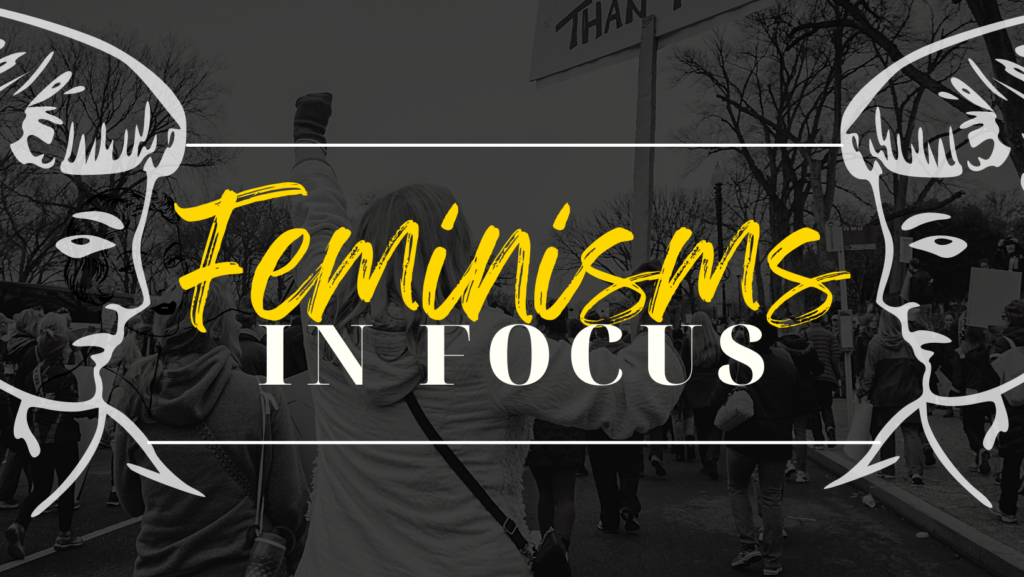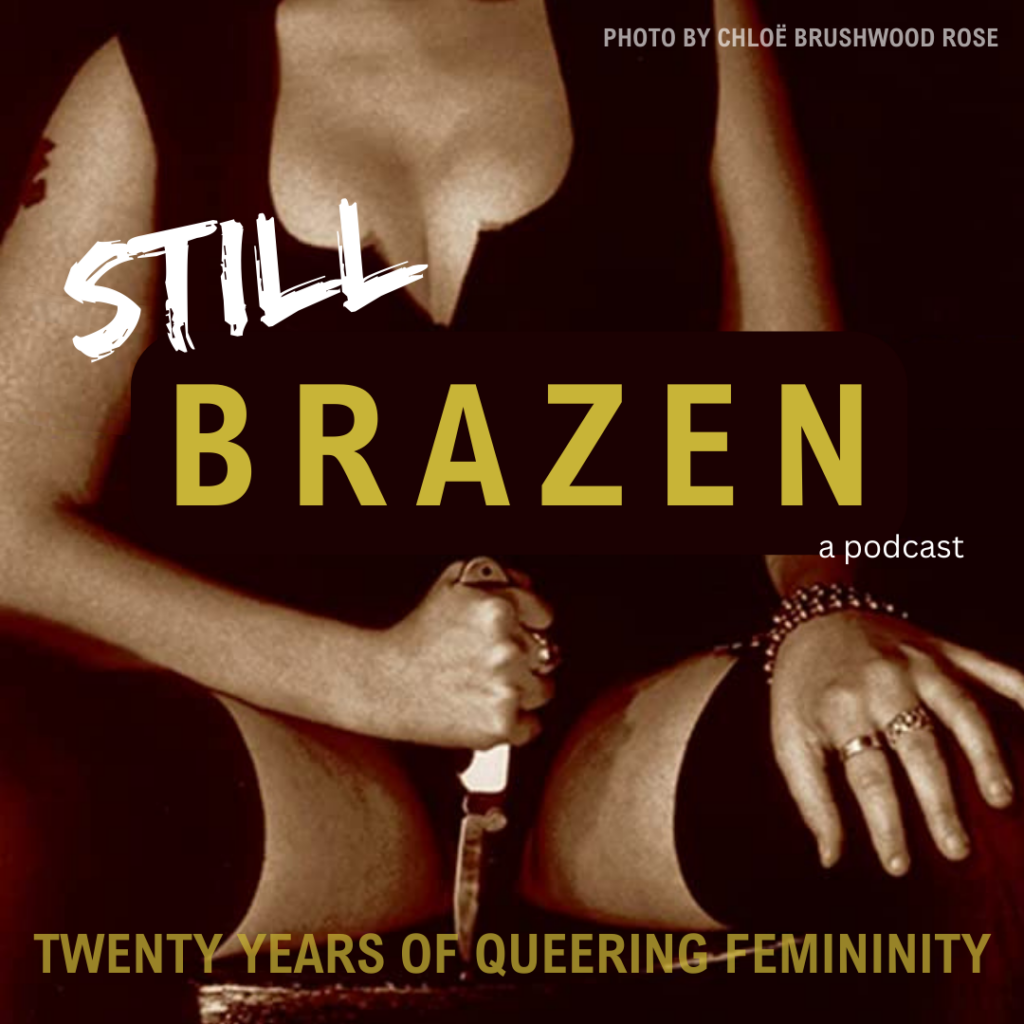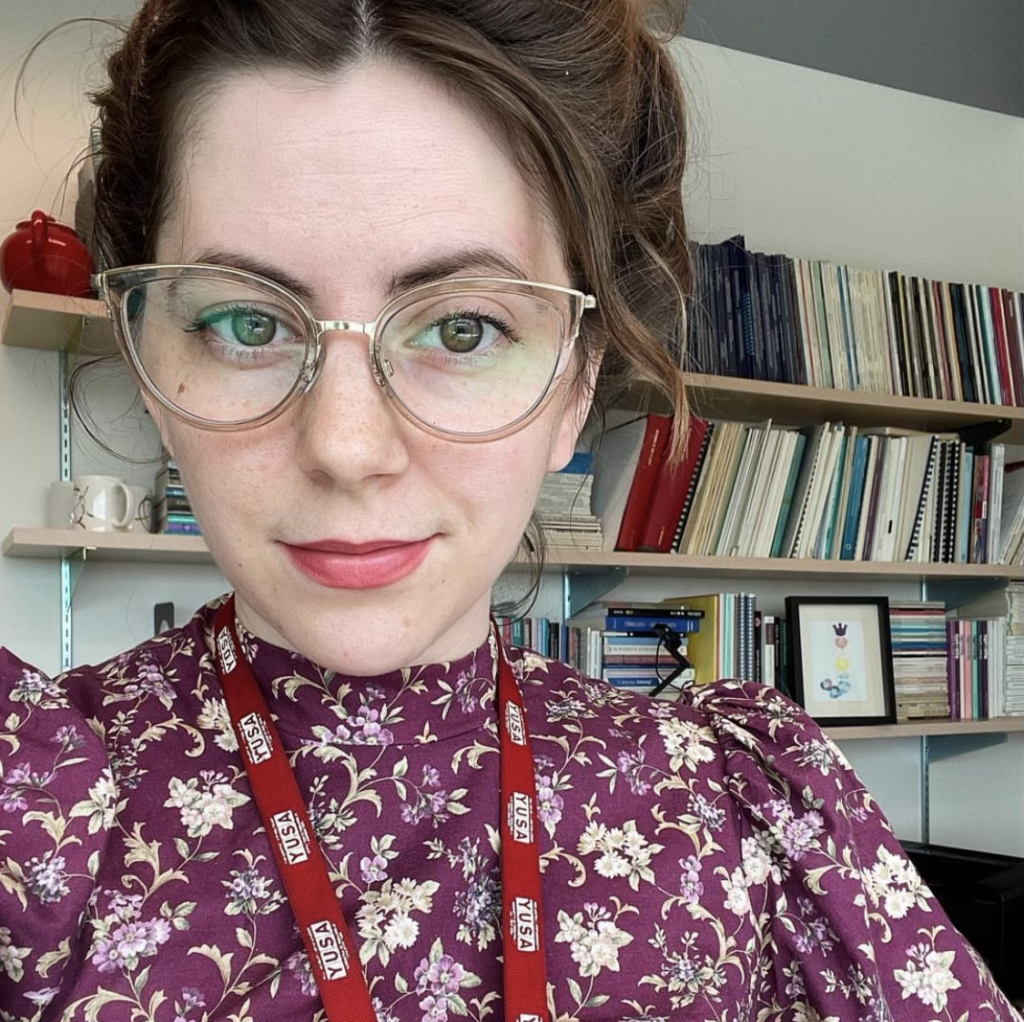Interview by Laura Brightwell and Jenna Danchuck

In 2002, editors Chloë Brushwood Rose and Anna Camilleri published Brazen Femme: Queering Femininity, a collection of prose, poetry, visual art, and theory that explored femme on its own terms. Femme is a politicized queer identity, often seen as emerging from lesbian bar culture of the 1950s and Black ballroom culture, which allows queer people to articulate their femininity in relation to their queerness.
Many femmes have talked about their experiences of femmephobia in community, where femininity is seen as less queer, radical, and/or sexy than masculinity. Brazen Femme brought us new, complex understandings of femme experience that changed the conversation about queer femininities. Now, a new podcast, Still Brazen: Twenty Years of Queering Femininity, brings together original contributors to the collection and emerging femme writers and scholars to discuss femme’s past, present, and future.

In this interview, podcast host and scholar Dr. Andi Schwartz talks about the importance of intergenerational conversations between queers, the continuities in femmes’ experiences, and podcasting as a medium.
Dr. Schwartz and Dr. Brushwood Rose are also co-creators of the Femme Story Archives Project, which is creating an oral history and archive of femme culture in Toronto in the 1990s. Follow the project on Instagram or Facebook to find out more. You can also listen to Still Brazen here.

You can follow Andi on Instagram @acafemmeic and read more about her work on femme here.
The original Brazen Femme anthology was, in many ways, about exploring what felt vital and difficult to femmes in the late 1990s. What questions do you think femmes are grappling with in the current moment?
I think what the podcast demonstrated was that femmes now are still grappling with many of the same questions that femmes were grappling with in the 90s, but perhaps in different ways.
Questions of belonging and community were important in the 90s and are still important now, but the way we engage with and experience community now are less place-based and more mediated, which alters the experience and questions surrounding community. Especially in the context of COVID-19, connections and community feel especially tenuous at the moment.
Many of the issues that femmes discussed on the podcast are perennial issues in queer, feminist, and femme communities: transmisogyny, sex worker rights, transnational and decolonial politics, fatphobia, disability, and violence—all discussed against the current backdrop of global fascism and backlash against queer and trans movements.
What was striking to you about these intergenerational conversations between femmes when you were editing the project?
So many things! One of my favourite things was realizing how excited the original contributors were to speak to the younger generation. I assumed that the younger femmes would be excited to speak to the older generation because we know and love their work, but I was also really touched to hear the enthusiasm that older femmes had for the younger femmes’ work and ideas. The conversations were very generous and generative, and I was grateful for that.
"Intergenerational dialogues really highlight how we are part of one, continuous struggle."
Dr. Andi Schwartz
What do you think is the value of intergenerational dialogues for feminist research?
At this particular point in my life and career, it is everything to me. I have spent a lot of time over the last few years participating in some kind of retrospective femme or feminist project that really instilled a sense of awe in me for people who have fought for things I take for granted now.
Maybe one of the most valuable things that intergenerational dialogues can do is dispel the progress myth—the idea that things, political and social things, are only and always getting better or more progressive. When I took a class called the Historical Development of Feminist Theory with Meg Luxton as a grad student, we read Mary Wollstonecraft, which I had never done. This was almost 10 years ago, but I was shocked to think that text was more progressive politically than many mainstream feminist texts!
And being part of the podcast has had a similar effect on my thinking about femme—looking back, being out and politically radical in past contexts just seems so, so brave. And it was!
Chloë, Anna, and I were laughing a bit about my amazement about how friendships blossomed and grew without the internet, but it’s really tough to imagine from my own context! It just seems like a lotta love. And it was!
But it also goes the other way. On the podcast, Zoe Whittall is almost disappointed that the piece “Fat is a Femme-inine Issue” still resonated for Allison Taylor because it means that not as much has changed as it sometimes seems; fatphobia, or fat hatred as they call it, is still rampant in queer, femme, and Leftist spaces. So, I guess intergenerational dialogues really highlight how we are part of one, continuous struggle rather than separate political femme movements—which can be both awe-inspiring and disillusioning.
"The Brazen Femme anthology, like a lot of femme media, is multi-authored and iterative, which is one of its political and discursive strengths."
Dr. Andi Schwartz
A lot of your own research looks at how femmes form communities, often around cultural production. How does your podcast project extend this practice?
This is a good question! My academic research was really sparked and inspired by my love for Tumblr in my late teens and early 20s. As a Master's student, I analyzed femme blogs, then my dissertation research focused on the femme culture and cultural production that occurred on Instagram in the late 2010s, which is perhaps just the forms of cultural product that were characteristic of those times.
One of the excellent things about the Brazen Femme anthology, or any anthology, is that it’s multi-voiced, and by returning to it in podcast form we are also making it iterative. Catherine Connell has said something similar about Tumblr in her article about Fa(t)shion February—it’s multi-authored and iterative, which was one of its political and discursive strengths.
So perhaps we can think about the Still Brazen podcast as keeping with traditions of femme cultural production, but extending these kinds of projects by thinking about femme culture as moving across time by way of moving across mediums.
How has the experience of podcasting compared to other methods used by yourself or others in the social sciences and humanities?
Podcasting is definitely becoming more popular in academia, and I’ve been inspired by that. Ethel Tungohan and Hannah McGregor are two scholars that do podcasts that I’ve been particularly inspired by, and there’s many, many more.
"I definitely took a lot of my inspiration from Hannah McGregor’s podcast Secret Feminist Agenda. I love the interview format, the rock music theme song and that you hear McGregor laughing with their guests at times. I’m really glad that the episodes on Still Brazen sound like that, too."
Dr. Andi Schwartz
The podcast format was more of a collaborative approach to research and even publishing than I’ve taken in the past. I knew that if I attempted to conduct all the interviews myself, they wouldn’t be as interesting as they could be. Pairing contributors with emerging scholars and writers working in the same area or form—and framing it more as a conversation than an interview—produced much more in-depth and thoughtful discussions than I could have done on my own.
I really value collaboration and creating spaces of exchange; that’s been something I’ve focused on in the past couple of years through organizing the annual Critical Femininities Conference and the Femme Scholars Series at the Centre for Feminist Research. Those have also been very collaborative endeavours, but the podcast was a bit different.
Do you see your project as in dialogue with or inspired by other femme podcasters?
I definitely took a lot of my inspiration from Hannah McGregor’s podcast Secret Feminist Agenda and the Amplify Podcast Network, which positions podcasting as its own form of scholarship. I really like the idea of a form of scholarship and publishing where you can bring your whole self, or at least more of yourself, to it.
Beyond that framing, I also love the interview format that SFA uses; the rock music theme song and that you hear McGregor laughing with their guests at times. Still Brazen is about politics, culture, and history, but it’s also about our stakes in it, our attachments to it, and our place in it. It’s our stories. So, I’m really glad that the episodes on Still Brazen sound like that, too.
Laura Brightwell and Jenna Danchuk are both PhD candidates in the Department of Gender, Feminist, and Women's Studies at York University and Research Associates with the Femme Story Archives.
